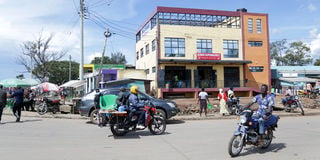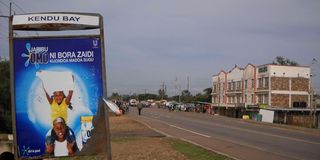Premium
Kendu Bay finally breaks the bankless town ‘curse’

Boda boda riders pick passengers near a supermarket in Kendu Bay.
What you need to know:
- One of the popular descriptions of Kendu Bay among Kenyans is “a town without a bank”.
- Residents either spend all their hard-earned money or keep it under the mattress at home.
Kendu Bay, a roadside trading centre in Homa Bay County, is known for many things apart from having a bank.
In fact, one of the popular descriptions of Kendu Bay among Kenyans is “a town without a bank”.
This phrase gained traction after ‘Nation’ published a story in May 2021 describing how the town, whose origins date back more than 100 years, has no bank.
As a result, residents either spend all their hard-earned money or keep it under the mattress at home.
Despite being one of the oldest towns in Kenya, Kendu Bay has struggled to grow economically, with the absence of banking institutions being cited as a major hindrance.
Stories abound of how Arab traders once conducted business in old Kendu Bay, ferrying goods from Mombasa to Kisumu via the railway and then onwards to Kendu Bay using Lake Victoria.
This trade, which took place in the late 1800s and early 1900s, turned Kendu Bay into a desirable location for anyone living in South Nyanza.
However, the town’s fortunes declined abruptly in the 1980s with the collapse of water transport. A large proportion of the population relocated in search of economic opportunities elsewhere.
Neighbouring smaller towns such as Oyugis, initially considered village markets, soon emerged as economic hubs, attracting financial institutions and offering diverse business opportunities.
This narrative is set to change, as Kendu Bay prepares to welcome its first bank.
Kenya Commercial Bank (KCB) has announced plans to open a branch in the town soon, sparking excitement among residents and business operators. Many view KCB’s move as a vote of confidence in the town’s economic potential.
In a letter seen by Nation.Africa and written by KCB Managing Director Annastacia Kimtai to Karachuonyo MP Adipo Okuome, the bank scheduled a grand opening on Monday.
“Kendu Bay, located in Karachuonyo Constituency, continues to grow as a commercial hub, with opportunities that attract investment and drive progress. With this foreseen potential in mind, KCB Bank Kenya intends to open a new branch in this region, the KCB Kendu Bay Branch, the first-ever bank branch in this vibrant town,” the letter reads in part.
A June 2024 Central Bank of Kenya report showed that the number of bank branches increased from 1,475 in 2022 to 1,511 in 2023, translating to 36 additional branches.

A section of Kendu Bay town in Homa Bay County.
Nairobi, Mombasa, Kiambu, and Nakuru account for 56 per cent of all branches.
Homa Bay Kenya National Chamber of Commerce and Industry (KNCCI) vice-chairperson, Rose Ouso, noted that Kendu Bay had long been served by banks in Oyugis or Homa Bay Town, both over 30 kilometres away. She argued that this affected business growth in the lakeside town.
She explained that the absence of banking institutions in Kendu Bay contributed to crime, as traders were forced to carry their day’s earnings home.
“If there were banks, traders could easily deposit their money and walk home assured that their earnings were safe,” Ms Ouso said.
She added that many small-scale traders had adopted unsafe methods of saving money, including table banking - a group-based funding system where members save and borrow from each other.
“Some groups would designate a treasurer to keep the money in their house, which exposed the funds to theft. In other cases, money was deposited in banks in Oyugis or Homa Bay but withdrawn entirely during distribution, leading to inefficiencies and risks,” she said.
The opening of a bank in Kendu Bay, Ms Ouso said, would enable traders to access loans and grow their businesses.
Supreme Council of Kenya Muslims secretary Nuhu Masud noted that the absence of banks had hindered business growth, leaving residents at the mercy of rogue financial institutions charging exorbitant interest rates.
Mr Masud also pointed out that residents had been forced to use distant banks for legal transactions, such as posting bail, which proved inconvenient.
He encouraged other financial institutions to explore Kendu Bay’s potential, offering residents more banking options and flexible loan repayment plans.
Shylocks had also infiltrated the town, providing small loans to traders using household items as collateral. Market chairperson Charles Ouya noted that some traders, unable to repay these loans, had resorted to suicide or abandoned their businesses.
Ms Sarah Adhiambo, a fish trader, lamented that existing credit services only benefited lenders, with high-interest rates plunging many traders into debt.
“Most traders live hand-to-mouth, fearing the loss of money stored insecurely at home. High transport costs to Oyugis or Homa Bay further discourage us from depositing money in banks,” she said.
Wholesale shop operators Fred Odhiambo and Mohamed Ibrahim shared that traders often temporarily closed their businesses to travel to Oyugis for banking, exposing themselves to potential robbery and loss of revenue.





